Productivity: The People vs. Congress
Tracking America’s real productivity gap: us vs. our elected
“Productivity is never an accident. It is always the result of a commitment to excellence, intelligent planning, and focused effort.” — Paul J. Meyer
“Congress has a deep, vested interest in its own inefficiency.”
— Robert A. Caro, Master of the Senate
The Cult of Productivity
In all my years of employment, I have never had a poor annual review. I’m confident that’s because my work product is pretty good, and even when it’s not at its best, it’s still not terrible. Therefore, the logical conclusion would be that I am quite productive.
Productivity is a funny concept. Often, at the end of the workday, I feel exhausted, but if you asked me how productive I was during the day, I would struggle to list the things I did that day. The annual review, an entirely silly concept in many regards, tries to sum up an entire year of your work and ultimately determine whether you are productive. Even when it’s apparent that you are, they still pass you over and promote someone else, a person who doesn’t do nearly as much as you, and yes, I’m speaking bitterly right now.
In Four Thousand Weeks, author Oliver Burkeman explores how we can use our time meaningfully. He convincingly argues that people in the 18th and 19th centuries didn’t think about how productive they were during their day. It’s mainly because they had nothing else to compare it to. Our work ancestors were not distracted by anything other than daydreaming or reading a book to steal their attention.
When the Industrial Revolution arose, people began to leave agricultural jobs and lifestyles to live and work in cities and factories. Working for someone else meant the boss was motivated to keep costs as low as possible for the product you were creating, while making you work long hours—all to line the pockets of the company owners.
Since we trekked indoors to make stuff, we have accelerated the way we shape our experiences, days, and, therefore, our lives. We punched a timecard, and at the end of the week, we received a paycheck. It’s basic stuff.
Industries may have changed or been created over the next 100 years, but the world we live in has become smaller and faster, and somewhere along the way, we have all been defined by how productive we are.
Squirrel!
This concept is deeply personal to me. I’m constantly thinking about how productive I am at any given moment. When most people relax, I‘m off writing and reading, activities that take a great deal of focus and intention for me to do well and make that investment worth it. When the weekend is rolling around, I’m writing various pieces of content – essays for Okay History, personal essays for something later, fiction for that short story, which will turn into a novel and one day be presented on the big screen. I’m also motivated to make up time for not reading and writing for most of my life. It’s only been the past seven years that I have made any concerted effort to keep track of what I read, and maybe a few years more of consistent writing.
It was only a year ago that I finally confronted my ADHD, which sapped my productivity as a kid all the way through my early to late 20s, when I developed workarounds. 2025 has been the year of peak productivity now that I properly medicate it. Anonymous asked me if I thought I would have been a better student if I had controlled my ADHD earlier. I emphatically said, “Yes.” I’m not a moron.
You and I face many more daunting opponents that affect our productivity. That massive personal computer in your pocket, for instance. Okay History is sapping your productivity right now. Unless you think learning this stuff is productive, then GOD LOVE YOU.
To match these destructive distractions, we have productivity gurus who write books like Burkeman, productivity apps on our phones, organizational planners, courses to take, gear to put on our ears to channel out unwanted noise, and anything and everything to help us be productive.
A Bunch of B(L)S
We love measuring our country’s productivity. For over 40 years, the Bureau of Labor Statistics (BLS) has tracked how “productive” Americans are. We defined productivity as output per hour worked. Thank goodness for unions, who got us eight-hour work days and five-day work weeks!
America, at its core, is football, Kick Ass Jesus, and being productive. We feel like our teams should be coached by Nick Saban, our enemies smote, and we should all be rich because of how hard we work. Instead, we have the Cleveland Browns, a humble and servant-leader Savior, and a huge income gap compared to what we produce.
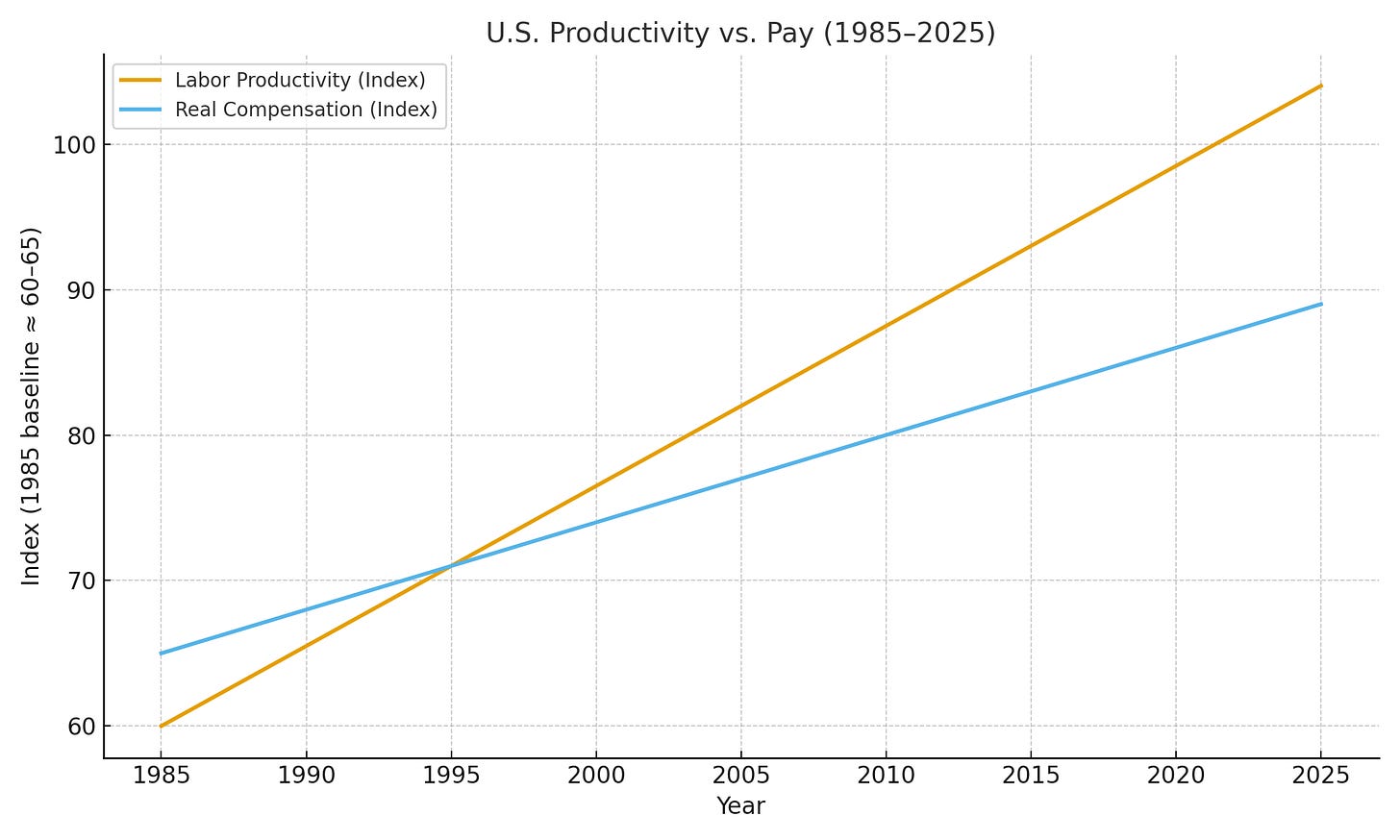
This chart comparing productivity and compensation is similar to where I think my intellectual capacity is compared to where it actually resides, and I got dumber once I got to college.
On top of this, everything is more expensive!
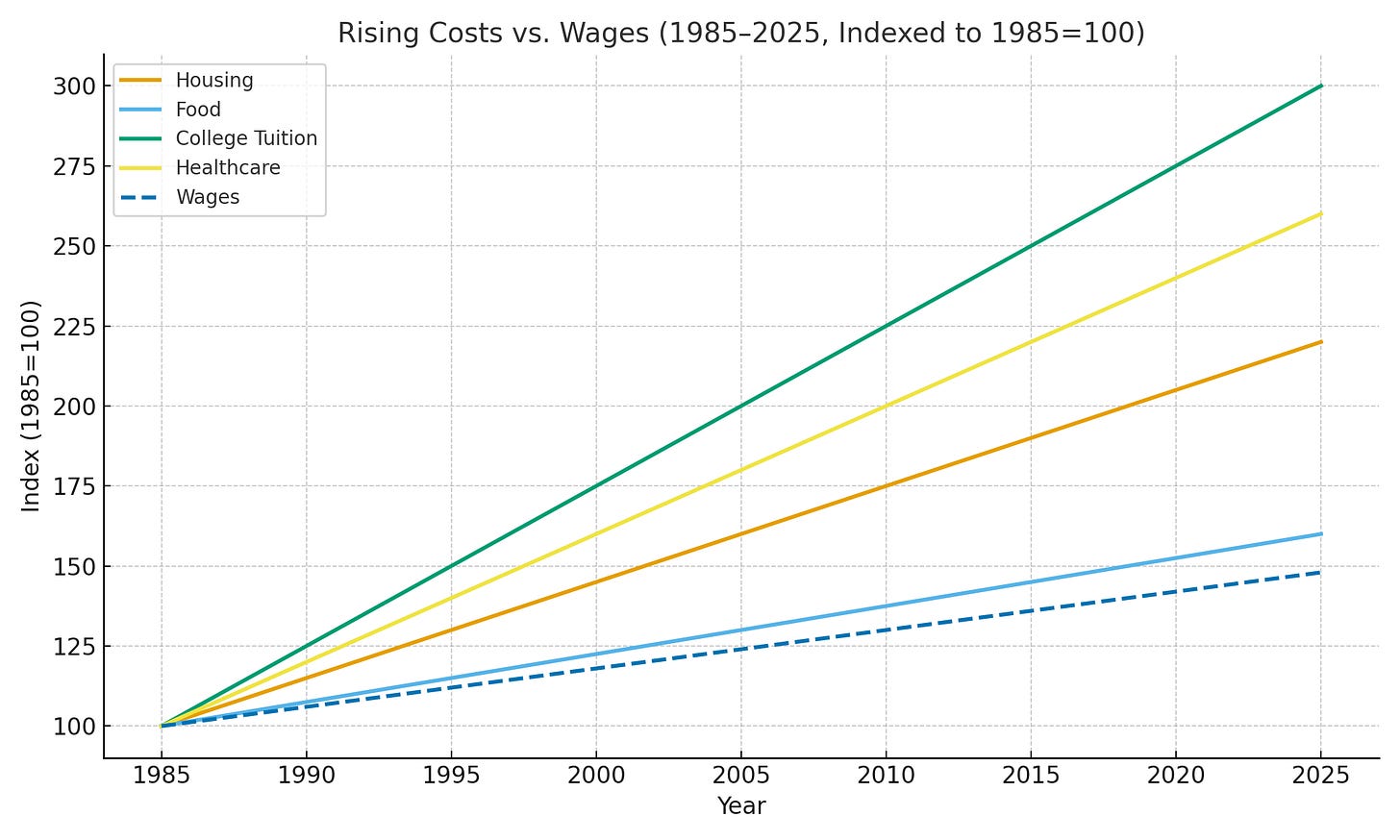
Housing has tripled. Food has doubled. In the meantime, who can afford to take their family to a Cleveland Guardians playoff game (which is totally going to happen this season)?
We are all productive—by a lot. We churn out ideas, products, and Instagram reels. We walk dogs, drive strangers all over town, and put cover sheets on the TPS reports like nobody’s business. But we are only paid a fraction of what our work overlords make and cannot afford stuff. On top of that, we have to sit through annual reviews and smile.
Meanwhile, Here in DC…
Is Congress as productive as we are? Nope. Instead, our lawmakers are showing up less, doing less, and somehow getting outstanding annual reviews from their constituents.
If the BLS can measure our outputs compared to time, we should be able to do the same with Congress. So allow me to introduce the Okay History Bullshit Ledger (OKHBSL)
According to the OKHBSL, Congress is measured by the bills passed. It’s literally in the job description. Since the 99th Congress (1985-1986), Congress’s productivity has been in a free fall. Back then, they passed 600-700 laws a session. Compared to today, where the 199th Congress limps along, knocking out fewer than 300. Instead of numerous small bills where multiple lawmakers can propose, debate, compromise, and pass bills, today Congress shoves everything into a suitcase, drags it to the airport, and argues with the ticket counter employee about how much it weighs.
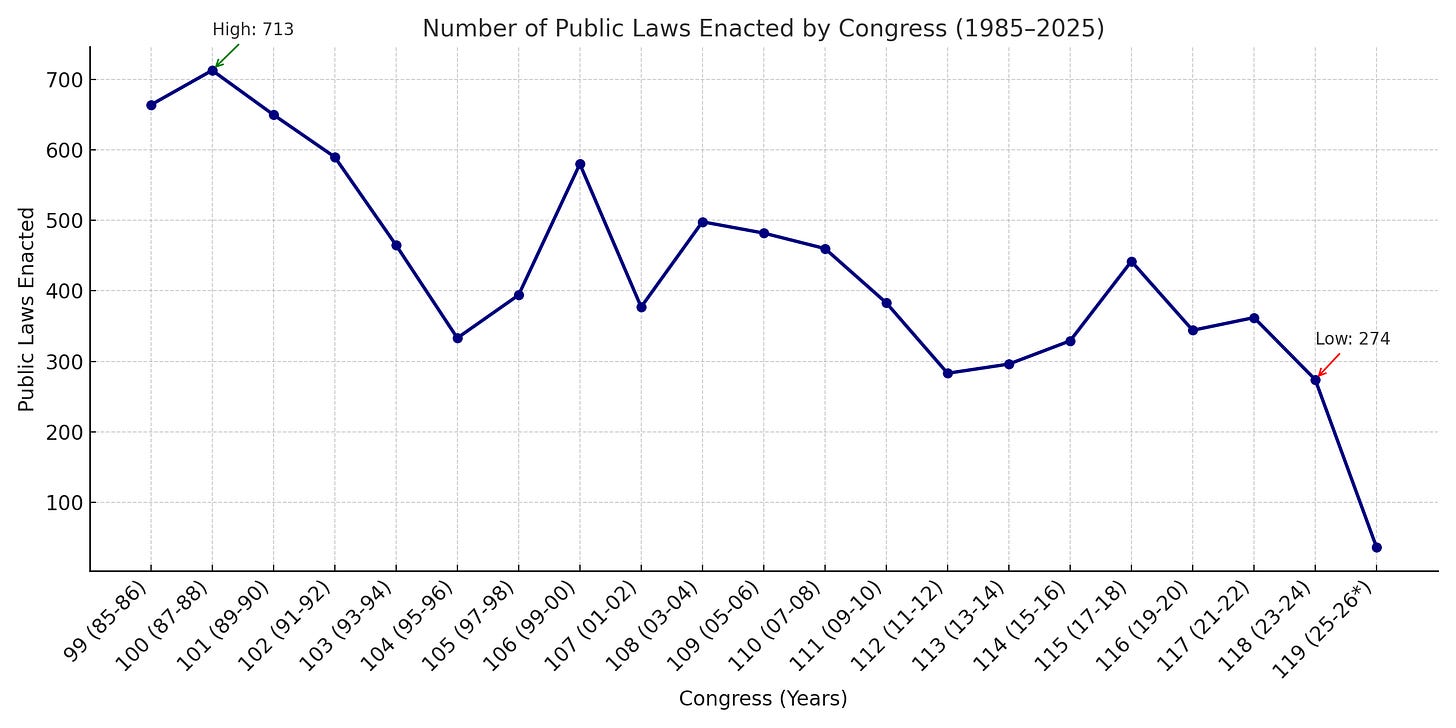
Congress spends a lot of time at the airport. They are spending fewer and fewer days in Washington, DC, and choosing to stay back in their districts. The entire point of Washington, DC, is for our representatives to be here to represent us. Again, look at the job title. Their job, in part, is to try to ensure our wages are going up and the price of goods isn’t skyrocketing to Mars. In 2025, House members average about 145 legislative days a year. When Back to the Future was in movie theaters, the House logged 282 days. The rest of their time is spent, I don’t know, campaigning back home and being on television.
When we compare the pay of our lawmakers, we see a steady rise in income and a flattening of salaries since 2009.
Now, overlap Congress’s pay and productivity, my goodness, they have broken the OHKBSL.
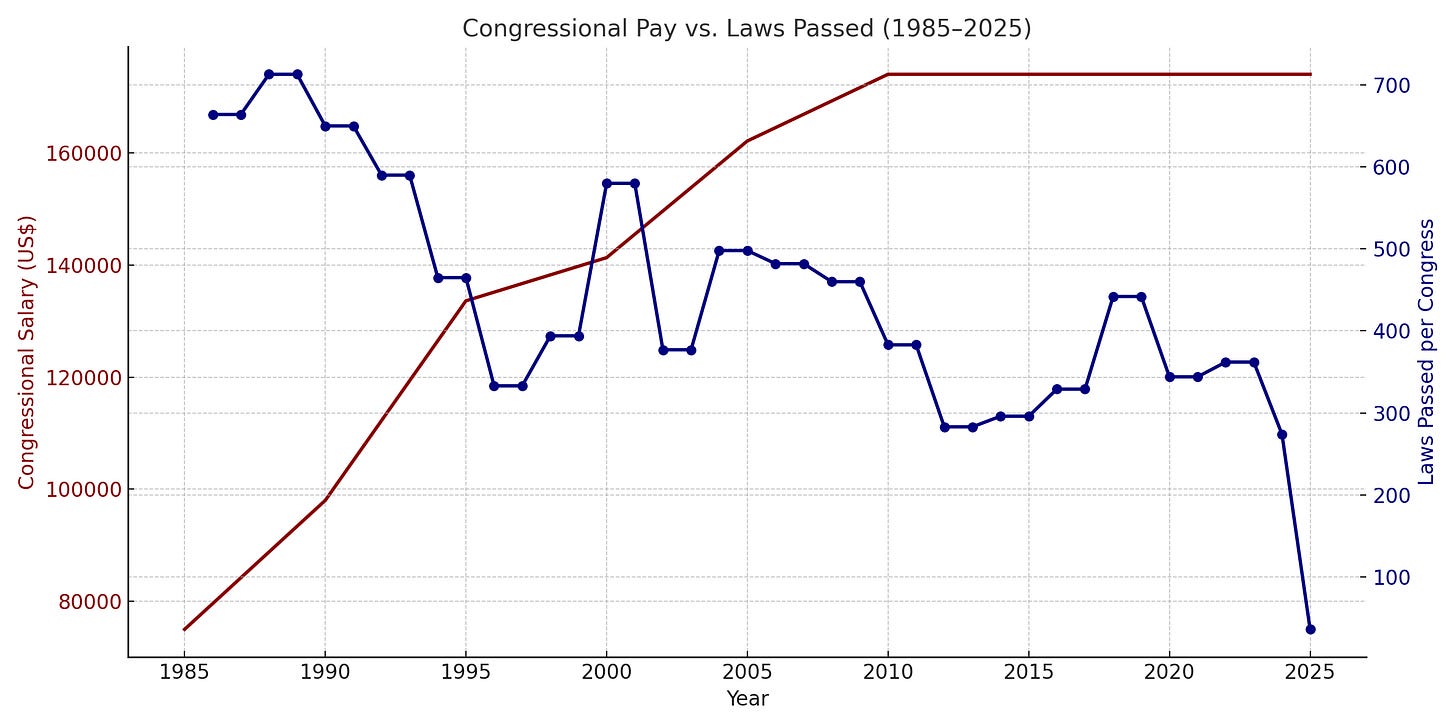
Shut it Down
Congress produces fewer bills, works fewer days, and maintains a high income. The conclusion should be—give them a bad review because they broke the OKHBSL. Instead, the threat of “shutting down” the government looms. Only this year will the shutdown come with illegal mass firings! Great job! More unproductiveness!
We are told to work harder, longer, and faster. Congress works lazier, fewer, and slower, yet they can land good-paying jobs and perks along the way. I have no idea how to correct it because my BSL is broken.
I’ll see everyone on Monday. Hope you have a productive weekend- the congressional way! Appreciate you.



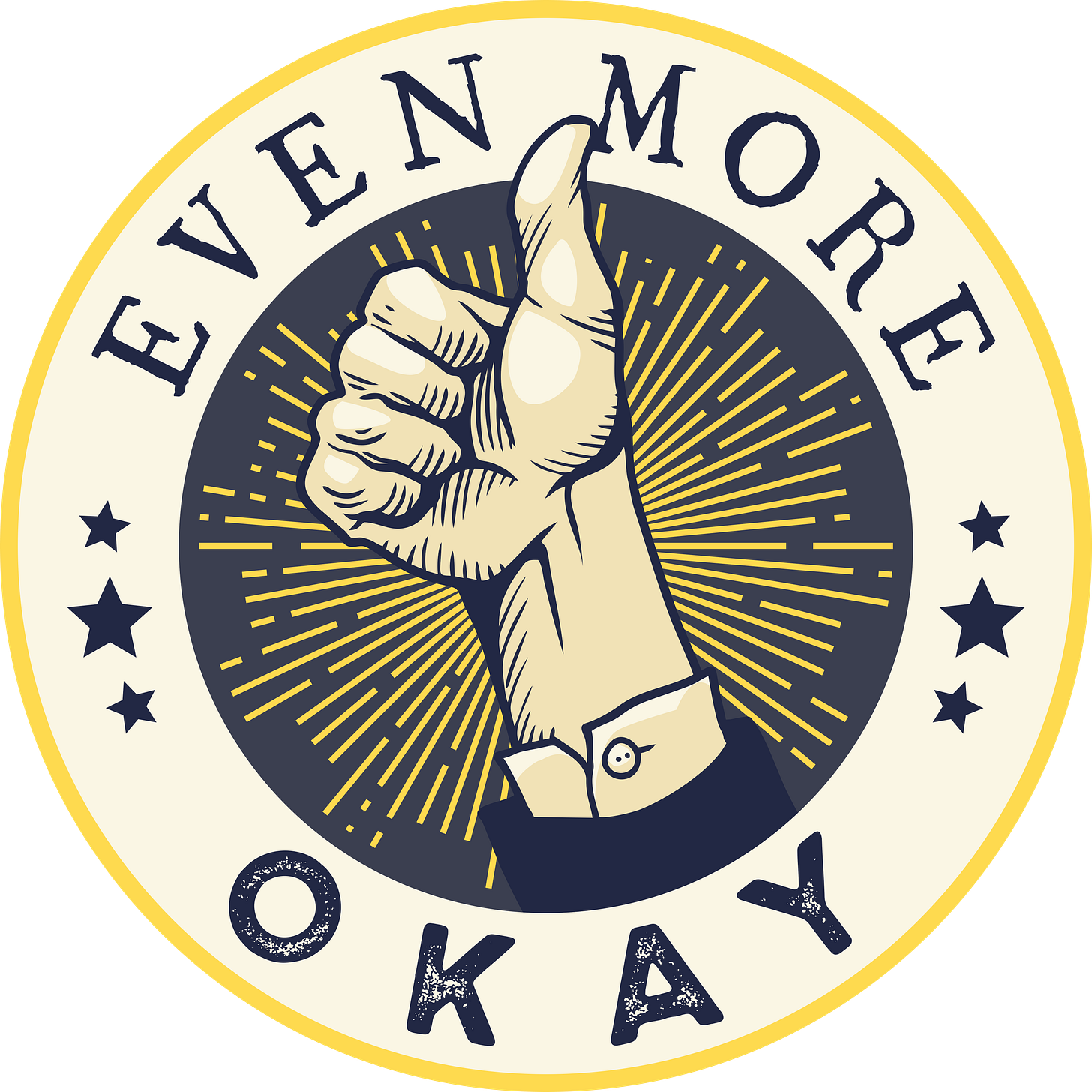
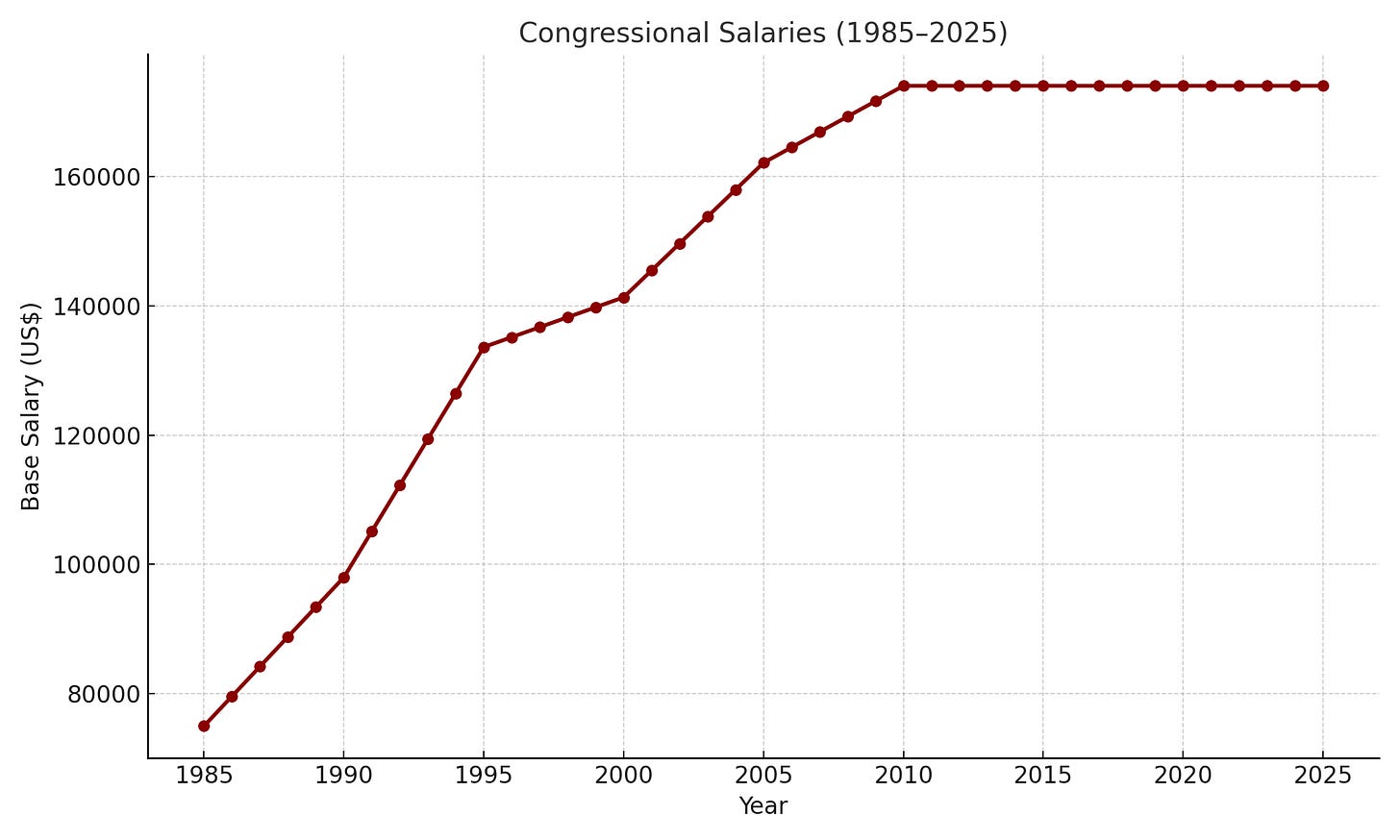

Great math!